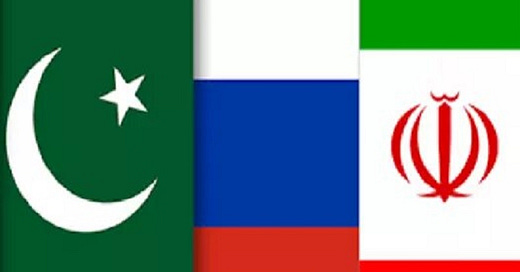While it remains unclear exactly what form their cooperation will take, such as whether it’ll involve a pipeline or just tankers, the intent is nevertheless to extend a helping hand to that South Asian state. Its post-modern coup authorities, however, have been reluctant about offending their American patrons by doing anything that could even remotely be spun as supposedly violating its unilateral sanctions against either of those two countries.
Iranian Oil Minister Javad Owji revealed on Wednesday that his country and Russia, which just reportedly signed a $40 billion energy pact, plan to cooperate on resolving neighboring Pakistan’s energy crisis. According to him, “Given the negotiations with the Russian state corporation Gazprom and the memorandum concluded with it, it was decided <...> to jointly [with Russia] implement a project to supply gas to Oman and Pakistan. Negotiations are underway with the Russian side on developing oil fields, implementation of liquefied gas projects, swap supplies of gas and petroleum products, the joint sale of crude oil and gas exports.”
While it remains unclear exactly what form their cooperation will take, such as whether it’ll involve a pipeline or just tankers, the intent is nevertheless to extend a helping hand to that South Asian state. Its post-modern coup authorities, however, have been reluctant about offending their American patrons by doing anything that could even remotely be spun as supposedly violating its unilateral sanctions against either of those two countries. This means that it might prefer for Pakistan to remain in the resource doldrums than dare to purchase Iranian and/or Russian energy, but the potential return of former Prime Minister Imran Khan to power could lead to it once again pursuing its objective national interests.
In the nearly one-third of a year since his American-orchestrated ouster, Pakistan unilaterally conceded on practically every one of its objective national interests in a desperate attempt to curry favor with the US, all to no avail whatsoever at all. This proud nuclear-armed country suddenly went from a geostrategic force to be reckoned with to just another US vassal state upon the removal of its patriotic Prime Minister, but its people rightly regarded this as absolutely unacceptable and have continued to peacefully protest against the imported regime. The former ruling party’s landslide victory in the Punjab by-elections is proof of how popular PTI has become and raises hopes that it’ll return to national power.
That scenario might be the only way that Pakistan would agree to Russia and Iran’s plans to resolve its energy crisis since the imported regime is likely too afraid of offending America by purchasing either of those two’s resources. They’d rather that their people continue suffering than risk defying that declining unipolar hegemon, which says all that’s needed about where their true loyalties lie. While the rest of the world embraced the unprecedentedly accelerated global systemic transition to multipolarity brought about by the Ukrainian Crisis, the compromised Pakistani elite decided to embrace the US instead, but that might be in the process of changing if former Prime Minister Khan’s political authority is restored.





Seems Putin was right, that resources would replace industrial plant as key in a post-modern world.